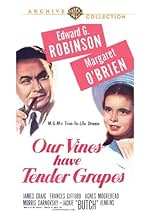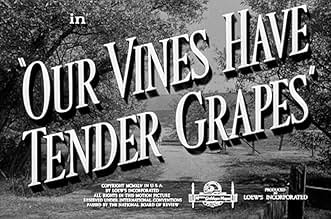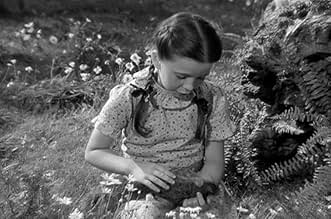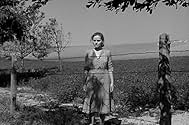IMDb RATING
7.6/10
2.5K
YOUR RATING
A Norwegian farmer lovingly raises his daughter in rural World War II-era Benson Junction, Wisconsin.A Norwegian farmer lovingly raises his daughter in rural World War II-era Benson Junction, Wisconsin.A Norwegian farmer lovingly raises his daughter in rural World War II-era Benson Junction, Wisconsin.
- Director
- Writers
- Stars
- Awards
- 2 wins total
Abigail Adams
- Girl
- (uncredited)
Robert Anderson
- School Boy
- (uncredited)
- Director
- Writers
- All cast & crew
- Production, box office & more at IMDbPro
Featured reviews
I was first drawn to this movie because it draws heavily on Swedish immigrant culture in the mid-1900s. My family was a Swedish farm family and there was a comfortable familiarity about the movie.
It's also a sentimental movie, but not in a saccharine way. The cadence is very slow and deliberate, like old Laurel and Hardys, or Thin Red Line. But because of this it makes you settle in and think about all the things that are happening to this family and their community. The sweetness is cut by ordinary tragedies, though these could have been better developed.
The movie celebrates family values, but not in a harping rhetorical sense. This is about family members who truly love each other, and stay open to and embrace changes from both outside and within. I was touched by this movie, and found it to be healing of my ideas regarding family.
Excellent performances by Moorhead, Robinson and O'Brien.
It's also a sentimental movie, but not in a saccharine way. The cadence is very slow and deliberate, like old Laurel and Hardys, or Thin Red Line. But because of this it makes you settle in and think about all the things that are happening to this family and their community. The sweetness is cut by ordinary tragedies, though these could have been better developed.
The movie celebrates family values, but not in a harping rhetorical sense. This is about family members who truly love each other, and stay open to and embrace changes from both outside and within. I was touched by this movie, and found it to be healing of my ideas regarding family.
Excellent performances by Moorhead, Robinson and O'Brien.
Every once in a while, Hollywood would turn out simple, almost humble films that were salutes to a kind of idealized America that still resonates in our collective American memory. "I Remember Mama" is one example, and the Norwegian-American community must have been a rich source for such reflection, because the Norwegian-Americans of Fuller Junction, Wisconsin, are the subject of yet another in "Our Vines Have Tender Grapes." It's amusing that the source of the title is the line from the Song of Songs that begins, "The Little Foxes"--a quote that made the title of quite a different film about quite different American values.
"Our Vines Have Tender Grapes" traces the fortunes of a small middle-American community, with particular focus on the Jacobson family, consisting of father Martinius (Edward G. Robinson), mother Bruna (Agnes Moorehead), and 7-year-old Selma (Margaret O'Brien). Selma's cousin Arnold is also featured, as is the editor of the local paper, other farming neighbors, the new schoolteacher (doing her practicum for a PhD in education, back in Milwaukee), and others.
There isn't necessarily a narrative here; the film provides an episodic look at a year in the life of this community, with tragedy, comedy, and all the human drama. Sometimes it gets a little too episodic, perhaps, as in the dribs of information we get on the life of an emotionally-disturbed neighbor girl. But we are not being asked to follow a narrative, we are merely being asked to spend some time with these people and observe their lives.
The request pays back the time spent. All the performances (with the possible exception of a rather wooden Butch Jenkins as Arnold, whose lips can be seen to move with Margaret O'Brien's lines in their first scene) are engaging. The great Edward G. Robinson once again shows his range (was there any kind of role that man couldn't play??), and Agnes Moorehead gets a chance to show range she isn't generally allowed to display. Margaret O'Brien's Selma can be seen as an outgrowth of Tootie from "Meet Me in St Louis," but I believe Selma is a much more emotionally-complex part and O'Brien takes that ball and runs with it. Her rendition of the Nativity story is JUST this side of saccharine, and it works, especially given the visceral punch of the final lines.
The screenplay was written by Dalton Trumbo, in his last Hollywood effort before the blacklist. Trumbo got the story from a book by George Victor Martin, who was the husband of the woman Selma became. According to the catalog of the American Film Institute, Selma Martin (then estranged from her husband) and her cousin Arnold sued MGM on the basis that the film caused them "undue public attention, mental anguish and humiliation." Staggering news, given the gentle, lovely portrayals of them the film provides.
This film shows up on Turner Classic Movies from time to time. You won't regret giving a couple of hours of your day to this story; it's truly worth it.
"Our Vines Have Tender Grapes" traces the fortunes of a small middle-American community, with particular focus on the Jacobson family, consisting of father Martinius (Edward G. Robinson), mother Bruna (Agnes Moorehead), and 7-year-old Selma (Margaret O'Brien). Selma's cousin Arnold is also featured, as is the editor of the local paper, other farming neighbors, the new schoolteacher (doing her practicum for a PhD in education, back in Milwaukee), and others.
There isn't necessarily a narrative here; the film provides an episodic look at a year in the life of this community, with tragedy, comedy, and all the human drama. Sometimes it gets a little too episodic, perhaps, as in the dribs of information we get on the life of an emotionally-disturbed neighbor girl. But we are not being asked to follow a narrative, we are merely being asked to spend some time with these people and observe their lives.
The request pays back the time spent. All the performances (with the possible exception of a rather wooden Butch Jenkins as Arnold, whose lips can be seen to move with Margaret O'Brien's lines in their first scene) are engaging. The great Edward G. Robinson once again shows his range (was there any kind of role that man couldn't play??), and Agnes Moorehead gets a chance to show range she isn't generally allowed to display. Margaret O'Brien's Selma can be seen as an outgrowth of Tootie from "Meet Me in St Louis," but I believe Selma is a much more emotionally-complex part and O'Brien takes that ball and runs with it. Her rendition of the Nativity story is JUST this side of saccharine, and it works, especially given the visceral punch of the final lines.
The screenplay was written by Dalton Trumbo, in his last Hollywood effort before the blacklist. Trumbo got the story from a book by George Victor Martin, who was the husband of the woman Selma became. According to the catalog of the American Film Institute, Selma Martin (then estranged from her husband) and her cousin Arnold sued MGM on the basis that the film caused them "undue public attention, mental anguish and humiliation." Staggering news, given the gentle, lovely portrayals of them the film provides.
This film shows up on Turner Classic Movies from time to time. You won't regret giving a couple of hours of your day to this story; it's truly worth it.
It's true - this is about as nice as it ever got with a movie. There are no villains, no violence (except when animals had to be destroyed in a fire...and that wasn't pictured), and just a nice story of a nice Norwegian family living in rural Wisconsin.
The story emphasizes two members of the family: the 7-year-old daughter, played by 1940s child star Margaret O'Brien, and her father, played by famous tough-guy actor Edward G. Robinson. This is Robinson as you rarely saw him and refreshingly low-key.
Yes, O'Brien tends overact a bit, but some of her lines are so touching, so moving and delivered with such a soft, sweet voice that she gets away with them. Her gesture at the end of the film - no "spoilers" here - is so astounding I doubt it would ever happen in real life.....but it's wonderful to see.
James Craig, Frances Gifford, Agnes Moorhead and Jackie "Butch" Jeknins all add to this old-fashioned wholesome film. (If those words turn you off, by all means, skip this movie.) Jenkins can be a bit much, but he does add humor to the movie. Craig and Gifford make an attractive couple.
This movie is highly recommended for those of you who want a break from films with "bad guys" and a lot of "edginess."
The story emphasizes two members of the family: the 7-year-old daughter, played by 1940s child star Margaret O'Brien, and her father, played by famous tough-guy actor Edward G. Robinson. This is Robinson as you rarely saw him and refreshingly low-key.
Yes, O'Brien tends overact a bit, but some of her lines are so touching, so moving and delivered with such a soft, sweet voice that she gets away with them. Her gesture at the end of the film - no "spoilers" here - is so astounding I doubt it would ever happen in real life.....but it's wonderful to see.
James Craig, Frances Gifford, Agnes Moorhead and Jackie "Butch" Jeknins all add to this old-fashioned wholesome film. (If those words turn you off, by all means, skip this movie.) Jenkins can be a bit much, but he does add humor to the movie. Craig and Gifford make an attractive couple.
This movie is highly recommended for those of you who want a break from films with "bad guys" and a lot of "edginess."
Of course you don't know me, but if you believe that I am the furthest thing from a sentimental person, you should trust me when I say this film (the title of which I cannot even bring myself to reproduce it's such a HORRIBLE title, one of the worst ever) blew me away. This film is like Debussey's music, it flows along and has a spontaneous quality to it, as if it weren't planned at all. The LACK of conflict for at least the first hour is a BOLD move esthetically. It took real guts to make this film, and real skill too. Those who would criticize its lack of "realism," its failure to acknowledge the DARK SIDE know not what they do. We NEED movies which acknowledge the fact that life can be good, that childhood can be fun, that the effortless insights of children make us laugh. I am still laughing at Arnold, who in one scene in the barn bombards Martinius and Selma with "why" after "why" after "why." "Why can't I go to school?" asks Arnold. "Because you're too young," answers Selma. "Why am I too young?" he asks. "Just because you are." "But why?" he asks again. "Because." Maybe it's just me, but that is one hilarious exchange of dialogue, one of many in the film. Margaret O'brien is BRILLIANT in these scenes, astonishingly natural in front of the camera.
Sure there are attempts to get deep about the war, and there are other "literary" moments of forced deepness, but overall this is one RARE piece of film ART, and an unjustly ignored CLASSIC.
Sure there are attempts to get deep about the war, and there are other "literary" moments of forced deepness, but overall this is one RARE piece of film ART, and an unjustly ignored CLASSIC.
One of Edward G. Robinson's most beloved films is this one in which he totally reverses type and becomes the wise father of Margaret O'Brien. Our Vines Have Tender Grapes and the tender grapes referred to are the children in their innocence, Margaret O'Brien and Jackie Jenkins.
In this rural Wisconsin town where few even have electricity, the settlers are mostly Norwegian immigrants who did like our American Midwest climate because it was so similar to Norway. They are a tight knit group and are a reserved bunch. But as the film shows, during a crisis they do come together.
O'Brien and Jenkins are an appealing pair of youngsters. Their childhood is a whole lot like Tom Sawyer's and Huck Finn's. Of course in one instance they try duplicating something Tom and Huck did that nearly turns tragic.
Agnes Moorehead also shows what a capable player she is in playing Robinson's wife and O'Brien's mother. I'm sure she was grateful for not playing an evil woman for a change.
There is a subplot involving a romance of editor James Craig and new school teacher Frances Gifford. Gifford is first quite resistant to the town, she's a big city girl, but she warms up to them and Craig.
But the film really belongs to Robinson and O'Brien. Robinson has a tough fight, but he more than holds his own in scenes with the little moppet. Sad he didn't do more films like this.
Our Vines Have Tender Grapes is a timeless classic, I think children and families of any age will identify and love it.
In this rural Wisconsin town where few even have electricity, the settlers are mostly Norwegian immigrants who did like our American Midwest climate because it was so similar to Norway. They are a tight knit group and are a reserved bunch. But as the film shows, during a crisis they do come together.
O'Brien and Jenkins are an appealing pair of youngsters. Their childhood is a whole lot like Tom Sawyer's and Huck Finn's. Of course in one instance they try duplicating something Tom and Huck did that nearly turns tragic.
Agnes Moorehead also shows what a capable player she is in playing Robinson's wife and O'Brien's mother. I'm sure she was grateful for not playing an evil woman for a change.
There is a subplot involving a romance of editor James Craig and new school teacher Frances Gifford. Gifford is first quite resistant to the town, she's a big city girl, but she warms up to them and Craig.
But the film really belongs to Robinson and O'Brien. Robinson has a tough fight, but he more than holds his own in scenes with the little moppet. Sad he didn't do more films like this.
Our Vines Have Tender Grapes is a timeless classic, I think children and families of any age will identify and love it.
Did you know
- TriviaJerry Maren, a member of the Lollipop Guild from Le Magicien d'Oz (1939), stood in for Margaret O'Brien in the scene where she is floating down the river in a bathtub.
- GoofsIn the opening scene, during the two-shot of Selma Jacobson and Arnold Hanson, he can be seen mouthing her lines as she says them.
- Quotes
Martinius Jacobson: [Entering Bjornson's new barn] You can still smell the new wood... finest smell on the earth.
- ConnectionsFeatured in A Night at the Movies: Merry Christmas! (2011)
- SoundtracksEntry of the Gladiators
(1897) (uncredited)
Written by Julius Fucík
In the score during the elephant sequence
- How long is Our Vines Have Tender Grapes?Powered by Alexa
Details
- Runtime
- 1h 45m(105 min)
- Color
- Aspect ratio
- 1.37 : 1
Contribute to this page
Suggest an edit or add missing content


























